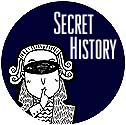
Comment
on this story |
 |

A sesquicentennial homage to Market Square's co-donor
by Jack Neely
It's both folklore and prickly legal fact that Market Square was donated to the city of Knoxville "as a curb market for farmers forever." The first Market House, a long, low building with arched entrances, opened exactly 150 years ago this month.
It seems fitting that we remember the two guys who started all this trouble by donating the land. You think of philanthropists as kindly old men; neither William Swan nor Joseph Mabry were old men. Neither, in fact, lived to be an old man. One of the most durable gifts in the history of Knoxville philanthropy came at the behest of men who were, respectively, 32 and 27 years old.
They turned out to have exotic destinies. I've written about Joe Mabry before. He and a son were killed in a shootout on Gay Street, hardly more than two blocks from Market Square, in 1882. It was a thoroughly efficient gunfight: all three shootists died on the scene. Mark Twain, who was putting the finishing touches on Life On the Mississippi, was probably grateful to run across the newspaper story; he included a deadpan account of the bizarre contest.
Swan might have been grateful to know that his fate would be less famous.
In 1854, though, Swan was the more prominent of the two. A college graduate at 16, he established his own law office, married Mabry's sister, and with his brother-in-law was one of the early developers of East Knoxville. He served as state attorney general, and shortly after their donation of Market Square, became mayor of Knoxville at 33. He served for two years, during which he had the signal honor of greeting the first locomotive train to arrive in town. He proposed that North Gay Street be leveled with fill at the new depot, allowing a tunnel for the train tracks. His proposal was voted down by council, some 65 years before the viaduct project accomplished something similar.
As mayor, Swan became close friends with Knoxville's most extravagantly controversial immigrant, Irish revolutionary John Mitchel, who had escaped from a penal colony in Tasmania. Swan and Mitchel became co-publishers of an idiosyncratic Knoxville-based weekly called The Southern Citizen, which often compared the South's plight to Ireland's, and proposed secession for both. The paper was progressive about some issues, like the telegraph, Sunday commerce, and the Victorian era's cant toward sexist nomenclature (they denounced the suffix -ess) but chilly toward Africans, Chinese, and terrorism-plagued Kansans ("Kansas and all subjects connected therewith have become an intolerable bore," stated an editorial in 1858.) As journalistic rivals, both Mitchel and Swan were bitter enemies of Parson Brownlow, who berated them in editorials.
Swan and Mabry lived near each other on the northeast side of town; Swan's estate, "Mayfield," was a mile east of the depot. An 1859 City Directory suggests he lived near the tracks of the line that ran to Virginia. Then, maybe, when trains were a novelty and a symbol of progress, and not too frequent, a residence by the tracks was stylish. Swan's law office, Swan & King, was on the same block of Gay Street where his friend Mabry would be shot to death a quarter-century later. Mitchel moved north, landing in Richmond, where he established a home.
During the war, Knoxvillians held seats in both Confederate Congress and U.S. Congress, an unusual circumstance that effectively gave Knoxville representation in two different countries. Horace Maynard was the U.S. representive. Knoxville's Confederate congressman was William Swan. He spent much of the war living in Mitchel's house in Richmond. The testy Swan got into trouble even with fellow Confederates, once attacking fellow Congressman Henry Foote with an umbrella in Foote's own home, leaving a gash in the former Mississippi governor's head.
After the war ended, Swan might have been expected to rejoin his prosperous brother-in-law in Knoxville, the city that had elected Swan mayor, and enjoy the Market Square he'd helped establish. Apparently resentful of being outnumbered by former Unionists in his hometown, Swan moved to Memphis, where he practiced law.
Swan died there in April, 1869, at the age of 48, "after an illness of two weeks." The Memphis papers seem foggy about his prewar career, stating only that "he was, we believe, the recipient of public favors" in Knoxville. Though his first obituary reported that his body was to be returned to Knoxville by train for burial here, Swan was instead buried at Elmwood Cemetery in Memphis.
An unsigned article about Swan in a 1921 Sentinel is riddled with inaccuracy: Swan's mayoral term in office was forgotten, the subject of a wrong guess. The only source mentioned in the article is former editor and businessman John Bell Brownlow, then 82 years old. You wouldn't expect the son of bitter Swan enemy and Reconstruction Governor Parson Brownlow to be charitable toward a man his father had once proposed killing. But in 1921, J.B. Brownlow declared that Swan had been one of Knoxville's greatest mayors.

January 22, 2003 * Vol. 14, No. 4
© 2004 Metro Pulse
|





